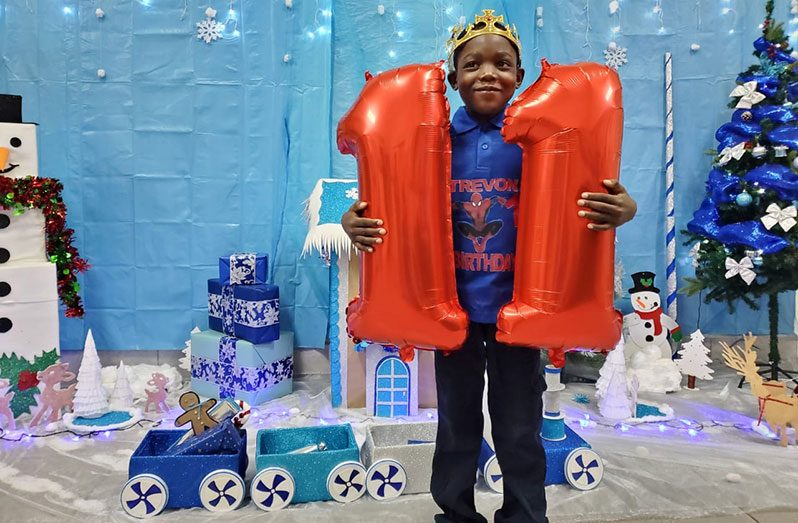– says mother of boy, 11, diagnosed with end stage renal disease
– family hopeful for kidney transplant
TREVON JOHNSON is an 11-year-old boy, who, like many other boys his age, enjoys Spiderman and spending time playing with his three siblings. At the age of four, however, he was diagnosed with nephrotic syndrome, a kidney disorder. And last year May he was diagnosed with end stage renal disease, which caused him to lose both kidneys.
End stage renal disease, often referred to as ‘kidney failure’, is the final stage of chronic kidney disease, which is marked by the gradual loss of kidney function. According to the Pan-American Health Organisation (PAHO), the kidneys filter waste and excess fluids from the blood, which are then excreted in the urine. When chronic kidney disease reaches an advanced stage, dangerous levels of fluid, electrolytes and wastes can build up in the body.

“It’s the most difficult situation- trust me- because from the moment you tell a patient or they hear ‘end stage kidney disease’, patients think of death. Immediately you can see patients fall into depression, some get sad, anxious, some think about finances and so forth,” Lasean Davis-Semple, a Medical Social Worker attached to the Nephrology Department at the Georgetown Public Hospital Corporation (GPHC) related.
But, Davis-Semple noted that the disease does not necessarily have fatal consequences. In fact, to remedy the loss of kidney function, she highlighted that there are two treatment options: dialysis and kidney transplant. Dialysis is the process – an expensive one at that – of removing the excess water, solutes, and toxins from the blood of those persons whose kidneys can no longer perform these functions naturally, or, who do not have kidneys. On the other hand, a kidney transplant is an operation that places a healthy kidney in the body.
“Because dialysis is a large financial venture and most persons cannot afford it, many of them would take home-based care,” Davis-Semple said during an interview with this newspaper. She explained that through home-based care, patients are just offered treatment until they pass away.

But that is not the treatment route for young Trevon Johnson. In a recent interview with the Guyana Chronicle, his mother, Nicola Lyken, related that the young boy has been receiving dialysis for the past year. First, he received his dialysis with the Doobay Medical Centre in New Amsterdam, Berbice. Since that centre shut its door a few months ago, he has since been receiving his treatment at the GPHC.
The treatment, however, is a taxing one. Financially, as aforementioned but also physically. That means that for a lot of the time, Johnson is confined to the ward.
“He doesn’t have a normal childhood,” the mother lamented, trying her best to hold back her tears. “He’s constantly crying to come back home with his family.”
“Being diagnosed with kidney disease can be a huge challenge, both for the patient and those people around them,” Dr. Areefa Alladin said recently, in her World Kidney Day Message.
Dr. Alladin emphasised that diagnosis and management, particularly in advanced stages of kidney disease, impacts severely upon their lives by reducing their ability, and that of their family and friends, to participate in everyday activities. While Johnson is affected, his mother also noted that there has been a great mental strain on her throughout the entire ordeal.
TRANSPLANT
But there is greater hope for young Johnson now as his mother said that he may be receiving a kidney transplant by the end of the month. Lyken noted that the family is hopeful for this transplant. Last month, 15-year-old Aditya Mohabir underwent a successful kidney transplant at the GPHC following the work of Dr. Kishore Persaud, Head of Department, Multi-Organ Transplant and Vascular Access Surgery and his team.
Johnson’s expected transplant and Mohabir’s successful transplant come amid the recent announcement by the government that there will be a new human tissue transplant legislation. This legislation will provide the regulatory framework which will enable Guyana to perform cadaveric transplantation; this is the transplant of tissue from ‘brain dead’ individuals, or cadaver as they are referred to, to living persons.
Currently, there is no legislation governing this area in Guyana, which means there is no legally provided criteria for identifying and labelling someone as ‘brain-dead’, whether a ‘brain-dead’ person can be removed from a ventilator and the method and procedure on how to do so.
This new legislation will also provide systematic regulations and guidelines to govern living donor transplants, which is the only type of transplantation currently performed in Guyana, along with a section pertaining to blood transfusion.
In the meanwhile, young Johnson’s mother is appealing for any assistance that can be provided to the family at this time given that the young boy’s continued dialysis treatment and his expected surgery will be costly. She can be contacted on: +592 689 3509



.jpg)











